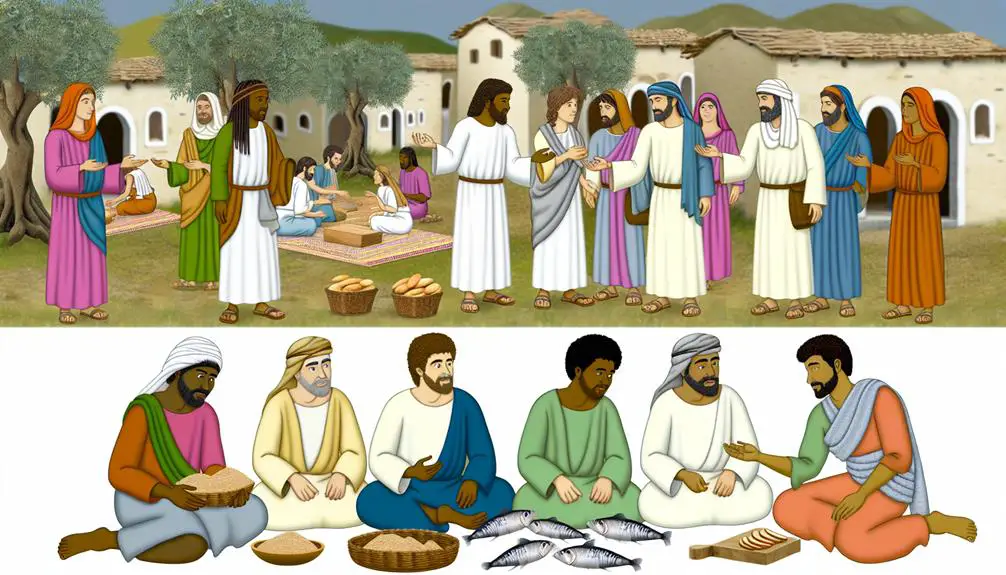Explore the multifaceted definition of ministry in the Bible, from ancient services to apostolic missions, and discover its relevance today.

Ministry in the Bible Definition
You might think that 'ministry' in the Bible is a straightforward concept, but it's laden with layers and nuances that merit a closer look. The term weaves through the Old and New Testaments, embodying everything from divine service to the toils of the apostles.
By exploring the biblical roots of ministry, you'll uncover how Jesus' model of service and the missions of the apostles set a foundation that challenges and enriches our understanding today. This journey through scripture will not only clarify what ministry meant in biblical times but also illuminate its implications for modern believers, leaving you to ponder how these ancient practices translate into today's world.
Key Takeaways
- Ministry in the Bible is rooted in service, compassion, and fulfilling God's covenant through community and individual actions.
- Jesus' model emphasizes humble servant leadership, prioritizing service over status and compassion over convenience.
- Apostolic missions highlight the importance of preparation, cultural sensitivity, profound scriptural knowledge, and community building for effective ministry.
- Spiritual leadership involves guiding with integrity, nurturing faith, and engaging with spiritual gifts for personal and communal growth.
Biblical Roots of Ministry

The concept of ministry deeply roots itself in biblical scripture, serving as a cornerstone for understanding divine service and communal leadership. This foundational aspect is illuminated through prophetic traditions and covenant duties, which together frame the essence of ministry within the ancient texts.
Prophetic traditions, particularly, underscore the role of individuals called by God to lead, warn, and guide the community according to divine mandates. These figures weren't just messengers; they embodied the ministry through their lives, actions, and words, demonstrating a profound commitment to God's will.
Similarly, covenant duties reveal the reciprocal nature of ministry. You're not merely a passive recipient of divine promises but an active participant in a sacred agreement with God. This involves responsibilities like justice, mercy, and faithfulness, which are pivotal in maintaining the covenant community's integrity. Through these duties, the Bible articulates a vision of ministry that's both communal and individual, calling for a personal dedication to God's service that extends outward in care and service to others.
In reflecting on these elements, it's clear that ministry, as depicted in biblical scripture, encapsulates a rich tapestry of divine service that's deeply intertwined with God's ongoing relationship with humanity.
Jesus' Model of Service
You'll find Jesus' approach to ministry is characterized by humble servant leadership and compassionate outreach. His actions and teachings consistently emphasize service over status, and compassion over convenience.
These foundational principles not only shaped the early church but continue to guide Christian ministry today.
Humble Servant Leadership
When examining Jesus' model of service, it becomes evident that humble servant leadership stands at the core of His ministry, inviting followers to embrace a path marked by selflessness and devotion to others. Leadership humility and a servant mindset are not merely virtues but essential qualities for transformative leadership. You're called to lead by example, prioritizing the needs and well-being of others above your own desires.
Aspect |
Description |
Biblical Foundation |
|---|---|---|
Leadership Humility |
Putting others first |
Philippians 2:3-4 |
Servant Mindset |
Serving rather than being served |
Mark 10:45 |
Selflessness |
Seeking the good of others |
1 Corinthians 10:24 |
Devotion |
Commitment to serving God and others |
Joshua 22:5 |
This model challenges you to reflect on your approach to leadership, suggesting that true greatness in God's kingdom is found in humility and service.
Compassionate Outreach Ministries
Delving into Jesus' model of service, we find compassionate outreach ministries at its heart, embodying a profound commitment to meet the physical and spiritual needs of others. This approach isn't merely about providing for the immediate, but it's deeply intertwined with principles of social justice and community building.
By analyzing Jesus' actions, you'll see a pattern of engaging with individuals and communities in ways that uplift and empower. His ministry wasn't passive; it actively sought to dismantle barriers and foster a sense of belonging among the marginalized. This model underscores the importance of viewing service not as a transaction, but as a transformative process that cultivates mutual respect and understanding.
Through this lens, compassionate outreach becomes a powerful tool for social change, echoing Jesus' enduring legacy of love and inclusivity.
The Apostles' Mission

You'll find that the Apostles' mission, as outlined in the New Testament, encompasses both the essentials of their apostolic journey and their roles as spiritual leaders.
This dual focus not only illustrates the depth of their commitment but also sheds light on the broader framework of Christian ministry.
Apostolic Journey Essentials
In understanding the Apostles' Mission, it's crucial to identify the core elements that were indispensable for their apostolic journeys. The preparation and execution of these missions required not only spiritual readiness but also practical considerations. Below are four essentials that underscored their endeavors:
- Travel Preparations: Ensuring logistical arrangements were in place was paramount. This included routes, provisions, and contingency plans.
- Cultural Sensitivity: Adapting to and respecting the diverse cultures encountered facilitated effective communication of their message.
- Scriptural Knowledge: A profound understanding of scriptures enabled them to teach and debate effectively.
- Community Building: Fostering relationships and establishing communities were central to spreading their teachings.
These elements collectively ensured the Apostles' missions weren't only embarked upon but fulfilled with purpose and impact.
Spiritual Leadership Roles
Exploring the Apostles' mission, it's essential to consider the multifaceted roles they assumed as spiritual leaders. Their journey wasn't merely about spreading the Gospel; it deeply involved embodying leadership ethics and providing pastoral care.
This nuanced approach demanded a balance between guiding the early Christian communities with moral integrity and attending to their spiritual needs with compassion and understanding. The Apostles' example illustrates that spiritual leadership transcends mere administrative duties; it's about nurturing a community's faith while upholding ethical standards.
Reflecting on their mission encourages you to appreciate the complexity of their roles. They weren't just messengers; they were shepherds, tasked with the spiritual well-being of their flock, a testament to the profound nature of genuine leadership.
Spiritual Gifts and Roles
Spiritual gifts and roles, as delineated in the Bible, serve as divine endowments that empower believers to fulfill their God-appointed ministries. These gifts, ranging from prophecy and teaching to healing and administration, aren't merely for personal edification but are crucial for the collective growth and edification of the church.
In this context, two critical concepts emerge: gift discernment and volunteer mobilization. These elements aren't just operational strategies; they represent the theological bedrock for understanding how divine grace equips individuals for service within the body of Christ.
- Gift Discernment: This involves recognizing and validating the spiritual gifts bestowed upon individuals. It's a process that requires wisdom, prayer, and often, community confirmation. Discernment ensures that gifts aren't just acknowledged but are also aligned with God's purpose for the church.
- Volunteer Mobilization: Here lies the practical outworking of discerned gifts. Mobilization isn't merely about filling ministry roles; it's about empowering believers to step into their divine calling with confidence and support.
- Community Building: Spiritual gifts foster a sense of unity and purpose. They help in knitting the church together, ensuring that every member feels valued and necessary.
- Spiritual Growth: Engaging in ministry through one's spiritual gifts is a pathway to personal and communal spiritual development.
Understanding and engaging with these gifts and roles is foundational to fulfilling one's ministry and contributing to the broader mission of the church.
The Church's Early Ministries

Having established the foundation of spiritual gifts and their role in empowering believers, let's now consider how these dynamics played out in the church's early ministries. In this formative period, community gatherings became the epicenter of ministry, illustrating a profound commitment to collective worship, teaching, and fellowship. These assemblies weren't merely social events but were pivotal in fostering a sense of unity and identity among believers, especially in the face of widespread persecution.
The early church's response to persecution showcases a remarkable aspect of its ministry. Instead of succumbing to fear or fragmentation, the community's hardships catalyzed a stronger, more cohesive ministry effort. Believers leaned into their spiritual gifts, using them as tools for resilience, mutual support, and evangelism. This period underscores a critical lesson: ministry, at its core, is about serving others, irrespective of the challenges.
Reflecting on these early ministries, it's evident that the church's foundational strategies—community gatherings and a proactive persecution response—were not just about survival. They were about thriving in adversity, propelled by a collective faith and a shared mission. This legacy of resilience and unity offers timeless insights for contemporary ministry.
Ministry in the Old Testament
Before delving into the New Testament's portrayal of ministry, it's crucial to understand its roots in the Old Testament, where ministry begins not just as a practice but as a covenantal concept integral to the faith community's identity and survival. The Old Testament sets a foundational framework for understanding ministry, highlighting:
- Temple duties as central acts of worship and service, where priests and Levites played essential roles in maintaining the sacred practices that connected the community to God.
- Prophet roles as God's messengers, tasked with guiding, warning, and sometimes rebuking the people and leaders according to divine directives.
- The importance of sacrificial offerings as a means of atonement, thanksgiving, and covenant renewal, emphasizing the community's dependence on and relationship with God.
- Leadership and guidance provided by judges and kings, whose responsibilities included not just political governance but also spiritual stewardship, ensuring the nation's adherence to God's laws.
These elements collectively underscore that ministry in the Old Testament was multifaceted, deeply spiritual, and communal, laying a rich tapestry of tradition and expectation that New Testament ministry would later build upon and transform.
Modern Implications and Challenges

In today's rapidly evolving world, the principles of ministry, rooted deeply in ancient scripture, confront new challenges and opportunities for adaptation. You're witnessing an era where digital evangelism is becoming increasingly pivotal, allowing the word to transcend traditional boundaries. Yet, this digital frontier isn't without its hurdles. You must navigate the complexities of online communication, ensuring that the essence of the gospel isn't lost in translation.
Moreover, secular resistance poses a formidable challenge. In societies where secular values are prominent, you're tasked with presenting the biblical message in a way that resonates, without compromising its core truths. This requires a nuanced understanding of the cultural landscape and an ability to engage in meaningful dialogue.
You're called to be innovative, leveraging technology to spread the gospel while staying true to its teachings. It's a delicate balance, blending ancient wisdom with modern methods. As you move forward, keep in mind that the effectiveness of your ministry in this digital age depends not only on the message you convey but also on how you adapt to these modern challenges.
Frequently Asked Questions
How Do Non-Christian Religions View the Concept of Ministry, and How Does It Compare to the Biblical Definition?
In exploring how non-Christian religions perceive ministry, you'll find it varies widely. Through interfaith dialogues and comparative theology, you'll see that while some traditions may have analogues to Christian ministry, emphasizing community service and spiritual guidance, others may not frame religious service in the same way.
This analysis highlights the diversity and depth of religious practices and how they parallel or diverge from the biblical definition of ministry.
In What Ways Has the Concept of Ministry Evolved in Popular Culture Outside of Religious Contexts?
You've noticed that the concept of ministry has evolved significantly in popular culture, moving beyond its traditional religious roots. Corporate volunteering and cultural philanthropy now embody this modern interpretation, reflecting a shift towards secular applications.
These forms of service emphasize community engagement and social responsibility, mirroring the selfless aspects of traditional ministry but in a broader, more inclusive context. It's a reflection of society's expanding understanding of service and support.
Are There Any Documented Instances Where the Principles of Biblical Ministry Have Been Applied in Secular or Non-Traditional Settings With Notable Success?
You're exploring how biblical ministry principles have been utilized beyond traditional religious settings. Interestingly, instances of corporate philanthropy and community service often reflect these principles, achieving notable success. Companies engaging in philanthropy often mirror the selfless giving characteristic of biblical teachings.
Similarly, community service initiatives frequently embody the ministry's emphasis on compassion and helping others. These secular applications demonstrate the adaptability and enduring relevance of biblical ministry concepts in modern society.
How Do Different Christian Denominations Interpret the Concept of Lay Ministry, and What Are the Implications for Believers Who Are Not Ordained Clergy?
As you navigate the mosaic of Christian denominations, you'll find lay ministry shaped by varied interpretations, like diverse streams feeding into a vast ocean.
These clerical roles, influenced by denominational practices, underscore a broader inclusion beyond ordained clergy.
Reflecting on this, you realize lay ministry's essence: empowering all believers to serve, blurring the lines between clergy and laity, and challenging you to rethink participation in your faith community's life and mission.
What Psychological Benefits, if Any, Do Individuals Experience When Participating in Ministry-Related Activities, According to Modern Psychological Research?
Modern psychological research suggests that engaging in ministry-related activities can significantly boost your mental health. By participating, you're not just fulfilling a role; you're actively enhancing your well-being through community bonding.
This connection with others fosters a sense of belonging and support, which is crucial for emotional stability. Reflecting on these findings, it's clear that the psychological benefits extend beyond spiritual fulfillment, offering a holistic approach to wellness.
Conclusion
In the grand tapestry of biblical history, ministry wasn't just a drop in the ocean; it was the ocean itself, vast and teeming with life. From Jesus' earth-shattering model of service to the apostles' globe-spanning missions, ministry has been the heartbeat of the faithful.
It's morphed through ages, from the whispered prayers in the shadowy corners of the Old Testament to the thunderous preachings in modern megachurches. Yet, the challenge remains as titanic as ever: to live a life that mirrors such profound legacy.



Sign up